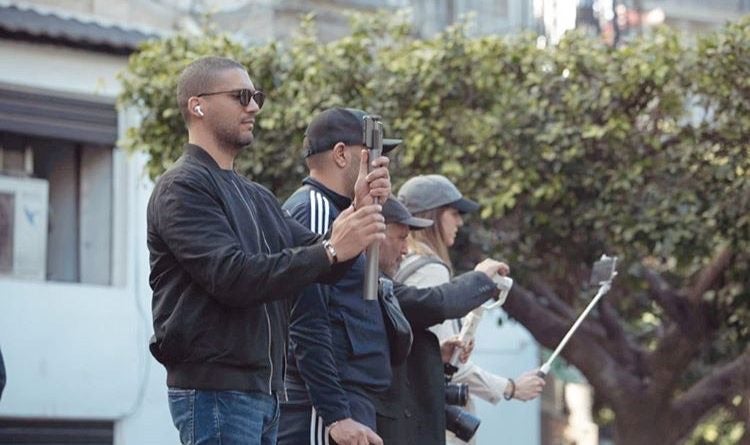Algeria: Prominent Journalist Facing Charges

Expand Journalist Khaled Drareni filming street protests in Algiers, December 2019. © Private Journalist Khaled Drareni filming street protests in Algiers, December 2019. (Beirut) – Khaled Drareni, a prominent journalist, was arrested on March 7, 2020 while covering the pro-democracy demonstrations in Algiers, Human Rights Watch said today. He was jailed for four days and then provisionally released, pending his trial. Drareni is being investigated on charges of “calling for an illegal gathering” and “undermining national unity” stemming from his reporting about the protests, which have been occurring regularly since February 2019.
The authorities should stop arbitrarily arresting activists and release those prosecuted solely for exercising their right to freedom of expression or assembly.
They should drop the charges against Drareni. “Drareni’s unjustified prosecution is the latest example of Algerian authorities’ intolerance for dissent,” said Eric Goldstein, acting Middle East and North Africa director at Human Rights Watch. “The government should end its efforts to restrict press freedom by criminalizing independent reporting.” Drareni is the founder of the Casbah Tribune website and the Algeria correspondent for French TV5 Monde. He also serves as the Reporters Without Borders monitor for Algeria. He is active in the protest movement and co-organized a conference which attempted to bring together Hirak activists, planned for February 14, that authorities prohibited. Drareni has covered the protests since the beginning, recording demonstrations and posting footage on his Twitter account. Police arrested him at about 2 p.m. on March 7 as he was filming the police crackdown on protesters on Didouche Mourad Avenue in downtown Algiers. Drareni told Human Rights Watch that police forced him into a van, together with other activists, including Samir Belarbi, one of the Hirak’s leaders. Police took him first to Rouiba police station, 20 kilometers away from Algiers, then transferred him at night, back to downtown Algiers, to the Cavaignac police station. On March 9, the prosecutor of the First Instance Court of Sidi M’hamed in Algiers extended Drareni’s pre-charge detention by 48 hours.
The police interrogated him repeatedly during his detention, largely about his involvement in the protest movement, he told Human Rights Watch. On March 9, police interrogators demanded his smartphone password, which he refused to provide. On March 10, the prosecutor charged him with “calling for an illegal gathering” and “undermining national unity” under articles 100 and 96 of the penal code respectively, two charges that the authorities have used routinely to prosecute hundreds of peaceful protesters.
The same day, a judge of the Sidi M’hamed First Instance Court provisionally released him but placed him under judicial control, seizing his passport and smartphone. Drareni told Human Rights Watch that he believes that his Gmail and the Facebook page of Casbah Tribune were hacked while he was in detention. Drareni had already been arrested and faced police harassment in the past months over his activism on behalf of the Hirak movement. On January 9, military officers took him to the military barracks in Algiers, where officers of the military judicial police interrogated him for several hours, asking about his statements in the news and on social media critical of the Algerian authorities.
They told him that his publications were “subversive, misleading and biased” and that this arrest would be the last warning before they sent his case to the judiciary, he said.
The Hirak movement began in February 2019 as millions of Algerians took to the streets to demand that then-President Abdelaziz Bouteflika step down, opposing his candidacy for a fifth term. After his resignation in April, the movement continued its pressure through large demonstrations in several cities calling for a more pluralistic and inclusive system of governance. Although the protest movement opposed holding presidential elections until the government made substantial changes in the political system, the Algerian authorities went ahead with a new presidential election on December 12.
The winner was Abdelmadjid Tebboune, who had served as prime minister under Bouteflika. Following his election, Tebboune declared that he is open to a dialogue with the Hirak movement and announced that the government would “consolidate democracy, rule of law and respect for human rights.” However, more than a year since the start of the massive Friday protests, the authorities have not overhauled provisions of the penal code and the laws on association and assembly that stifle rights.
The authorities have relied on articles in the penal code criminalizing “illegal gathering” to silence critics and crack down on protests. According to the National Committee for the Liberation of Detainees, more than 1,400 activists and protesters have been arrested since the beginning of the protest movement, and at least 173 protesters are currently on trial on charges stemming from their peaceful participation in protests or for their activism. “Instead of keeping their promises for political change, the Algerian authorities are trying to silence voices of dissent,” Goldstein said. “The authorities should drop the charges against Khaled Drareni and other protesters being put on trial for criticizing the government and initiate the long-awaited r.
Read the full article at the original website
References:
- https://www.hrw.org/middle-east/n-africa/algeria
- https://www.hrw.org/about/people/eric-goldstein
- https://www.hrw.org/news/2020/02/24/algeria-one-year-activists-languish-jail
- https://www.youtube.com/watch?v=MrTeS-6kWfw
- https://www.tsa-algerie.com/abdelmadjid-tebboune-prete-serment-et-promet-un-changement-radical/
